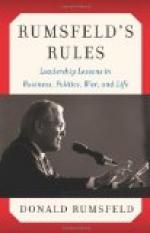The man to be trusted is, unfortunately, not Lord Wolseley. I have for years fought his battle by urging that the Government ought to follow the advice of its military adviser, a theory of which the corollary is that the adviser must resign the moment he is overruled. I have never meant that the adviser is to be a dictator, nor that the Cabinet should follow advice of the soundness of which it is not convinced. The Cabinet has the responsibility and ought never to act without full conviction. The expert who cannot convince a group of intelligent non-experts that a necessary measure is necessary is not as expert as he should be; and if he still retains his post after he has been overruled on a measure which he regards as necessary he has not the strength of character which is indispensable for great responsibility. Now, though the relation between a Cabinet and its advisers ought to be secret, in the present case each side has let the cat out of the bag. Lord Wolseley’s friends defend him by declaring that he has been overruled. But that defence kills him. If he has been overruled on a trifle it does not matter, and the defence is a quibble; if he has been overruled on an essential point why is he still Commander-in-Chief? No answer can be devised that is not fatal to his case. Lord Lansdowne’s friend, for such Lord Ernest Hamilton may be presumed to be, says: “Supposing, for the sake of argument, that the short-comings of the War Office in and before the present war were due




